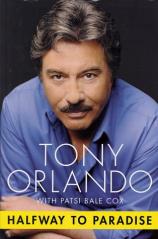Halfway to Paradise
Review
Halfway to Paradise
Anyone old enough to remember back to 1973 knows the name Tony
Orlando. That's the year the singer and his female back-up duo Dawn
recorded "Tie A Yellow Ribbon Round the Old Oak Tree."
The top-40s ditty about a petty criminal welcomed back from prison
became the theme song for returning Vietnam POWs, a rallying point
for families of American hostages in Iran and soldiers serving in
the Gulf War, and an all-purpose anthem for anyone forced to be
away from home. As part of the national soundtrack of the late 20th
century, the song earned Orlando a place in pop culture
history.
Or, as Orlando puts it in his autobiography --- "Almost like
flipping a pancake, 'Tie A Yellow Ribbon Round the Old Oak Tree'
flipped my life over." HALFWAY TO PARADISE is peppered with such
passages --- writing that is clumsy, yet gets the point across. One
of the book's most distracting shortcomings is Orlando's fondness
for clichéd phrases such as, "singing my praises," "walking on
eggs," "turned the tide," and "sweating bullets." He also seems
confused about the meaning of the word "literally," as when he
describes his father "literally sucking the air out of the
room."
Nevertheless, Orlando writes with a self-effacing candor, humility
and lack of animosity that gives this book a gentle appeal absent
from many celebrity autobiographies. Patsi Bale Cox, who has
collaborated on the autobiographies of performers including Tanya
Tucker and Loretta Lynn, assisted in the writing. But the book's
voice sounds as if it's rising straight from Orlando's sentimental
soul.
Although he's fond of using the word "ironically" to describe
coincidences, irony isn't on his palette. He makes statements like
"The band has become like family to me, as all bands should to an
entertainer." Talking about his deceased sister, "Rhonda was my
angel on earth who now resides in Heaven," he betrays no hint that
he blushed when he wrote the words.
Orlando is an entertainer who knows he's not A-list and never was.
He drips with awe and gratitude when he talks about the legends ---
Jackie Gleason, Frank Sinatra, Muhammad Ali --- who took an
interest in him throughout his career.
He's a man who screwed up in his personal life --- marital
infidelity and drug abuse, his two biggest failings --- and counts
himself blessed to be coming up on 60 with a loving family and good
health.
The book takes him from his boyhood in the close-knit working class
neighborhood of Manhattan's West 21st Street, to his entry into
show business singing demo songs, to his short-lived run as a teen
idol, to his first steady job working for a music publisher. The
core of the book takes place during the 1970s, those few heady
years when Orlando was a star, recording a string of pop hits and
appearing with Dawn in his own network variety show.
It was during Orlando's professional peak that he bottomed out
personally. He watched his close friend Freddie Prinze die after
shooting himself in the head, then ended up in a straightjacket
after entering a mental hospital to battle a cocaine habit.
By the '80s, the drugs were over, but so was Orlando's run as a pop
star. Since then, he has struggled to redefine his career,
performing on Broadway and in Las Vegas and acting in a movie with
Edward James Olmos. In the mid-'80s, he tried to get back into
network television with the help of Bill Cosby, who wrote an
episode for his own sitcom designed to create a spin-off in which
Orlando would star. In a winningly candid moment, Orlando admits he
blew the taping.
"The network turned down a spin off, and it's no wonder," he
writes. "I've watched it several times over the years and, even
with the mellowing effect of time, my performance stunk, then and
now."
Orlando now lives in Branson, Missouri with his second wife,
Frannie, and their daughter. He performs in Branson and does some
touring. He is not rich, and he is famous mostly in a used-to-be
sort of way. But he gets to sing and he can support his family, and
it seems to suit him just fine.
Ultimately, this book is less interesting as a celebrity
autobiography than it as the story of a family man in late middle
age, finally getting it right.
Reviewed by Karen Jenkins Holt on January 22, 2011
Halfway to Paradise
- Publication Date: October 16, 2002
- Genres: Autobiography, Nonfiction
- Hardcover: 320 pages
- Publisher: St. Martin's Press
- ISBN-10: 0312266030
- ISBN-13: 9780312266035




